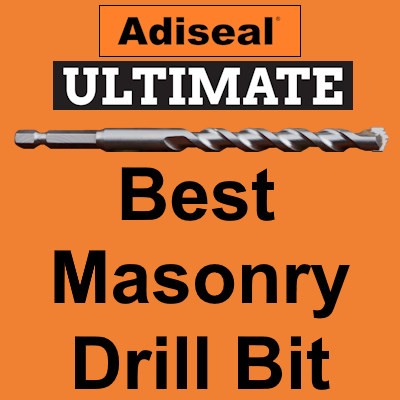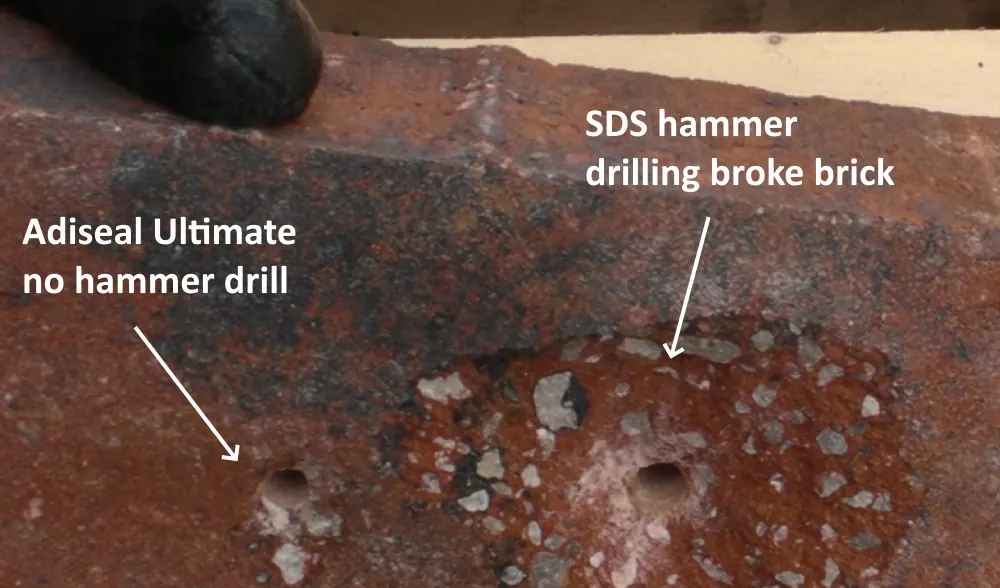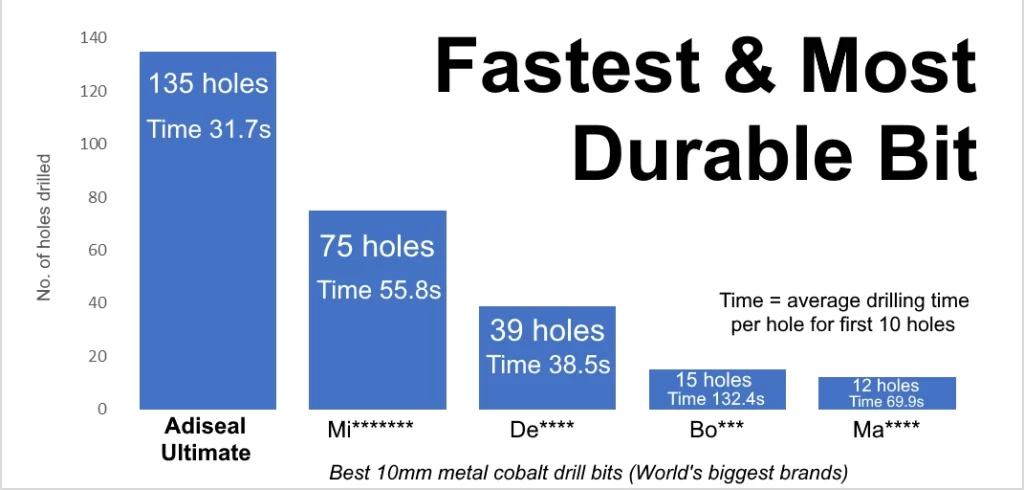Carbide Drill Bit
Best Carbide Drill Bits 2023: Masonry & Multi-Material
Adiseal Ultimate carbide drill bits excels in both speed and endurance compared to other carbide drill bits for masonry or multi-material. When drilling without hammer function, it drills faster than any other bit. Drilling hard masonry materials like brick or concrete has numerous advantages over hammer drilling. With its 1/4 inch hex shank, this carbide masonry drill bit effortlessly drills into various materials like brick, concrete, stone, wood, plastic, and more.
Advantages of no hammer drilling
Here are a few benefits of non-hammer drilling over hammer drilling:
- Quieter drilling
- Less vibration damage on hands
- Can drill closer to an edge
- Less risk of loosening mortar
- Less risk of damaging substrate
The 1/4 inch hex shank not only prevents the carbide drill bit for masonry from spinning in the chuck but also enables faster bit changes.

Quieter drilling
Using the hammer function during drilling creates loud noise, posing a risk of hearing damage and causing disturbances to others. Opting for drilling without the hammer function ensures a quieter operation, minimizing the risk of hearing damage and disturbances to those nearby.
Less vibration damage to hands
Frequent use of vibrating tools can lead to hand damage, including conditions like vibration white finger syndrome. Drilling without the hammer function decreases hand vibration, lowering the risk of developing vibration white finger syndrome.
Can drill closer to an edge
Drilling near an edge with a hammer drill can easily damage the substrate, particularly in hard materials like brick and concrete. Opting for non-hammer drilling in concrete enhances safety when drilling close to an edge, reducing the risk of material breakage.
Less risk of loosening mortar
Using a hammer drill to bore into materials like concrete or brick can potentially dislodge the brick and mortar. Non-hammer drilling reduces the likelihood of this happening, making it more suitable for drilling brick walls.
Less risk of damaging substrate
The impact of a hammer drill on tough materials like brick and concrete may cause the substrate to break, especially in areas where the brick has been chased out, such as to fit an electrical back box. Drilling concrete or brick without the hammer function decreases the risk of substrate breakage, ensuring a safer drilling process.

Adiseal Ultimate Carbide Drill Bit (No Hammer) vs SDS Hammer Drill Speed Test
In our test, a Adiseal Ultimate 6mm carbide masonry drill bit, used in a standard cordless drill without the hammer function, matched the drilling speed of a corded SDS hammer drill, both taking 5 seconds to drill into a brick. However, the SDS hammer drill broke the brick, a common issue associated with hammer drills, while the Adiseal Ultimate carbide drill bit drilling without hammer function didn’t cause such damage.
How to use a carbide drill bit
How to use a carbide drill bit
- Prepare the Workspace
Mark the drilling point on the masonry surface with a pencil or marker. Use a center punch or awl to create a small indentation at the marked point to prevent the drill bit from wandering.
- Tool Setup
Insert the carbide masonry drill bit into the drill’s chuck. Ensure it’s securely tightened to prevent slippage during drilling.
- Drilling Technique
Adjust the drill to the appropriate speed for masonry. Apply consistent pressure, keeping the drill bit perpendicular to the surface. Initiate drilling at a slow pace to begin a pilot hole, then gradually ramp up the speed.
- Drilling
Drill into the marked point using a constant and even pressure. Avoid excessive force, as the carbide bit’s design allows for efficient drilling without the need for significant pressure.
- Cooling and Clearing
Periodically withdraw the drill to allow debris to clear, and if necessary, use water or a cooling lubricant to prevent overheating and prolong the bit’s life.
- Completion
Once the hole is drilled to the desired depth, switch off the drill and carefully withdraw the bit from the surface.
- Cleanup
Clear any debris or dust from the drilled hole and surrounding area.
Materials
The Adiseal Ultimate heavy duty carbide masonry drill bit & multi-material drill bit is versatile, capable of drilling into various materials such as:
Sizes available
The Adiseal Ultimate hex shank carbide masonry drill bit (multi-material) is presently offered in the following sizes:
- 4mm x 100mm
- 5mm x 100mm
- 5.5mm x 150mm
- 6mm x 150mm
- 6.5mm x 150mm
- 8mm x 150mm
- 10mm x 150mm
- 12mm x 150mm
- 12mm x 400mm (Extra long masonry drill bit)
Best metal drill bit
In their attempt to make available the best drill bits, also in the Adiseal Ultimate lineup is the fastest and most durable metal drill bit available. In our stainless steel drilling test using a drill press, it showcased superior speed and perforated more holes than any other cobalt metal drill bit. Outperforming renowned brands like Milwaukee Cobalt Red, DeWalt Extreme, Bosch Cobalt, and Makita, it solidified its position as the premier metal drill bit.

| 10mm metal cobalt drill bit | Total number of holes drilled (in 6mm stainless steel) | Time to drill each holes (average of 1st 10 hole) |
| Adiseal Ultimate cobalt | 135 holes | 31.7 seconds |
| Milwaukee cobalt red | 75 holes | 55.8 seconds |
| DeWalt Extreme cobalt | 39 holes | 38.5 seconds |
| Bosch cobalt | 15 holes | 132.4 seconds |
| Makita cobalt | 12 holes | 69.9 seconds |
Where to buy the best carbide masonry drill bit
To buy carbide masonry drill bit and carbide multi-material drill bits in the UK, please contact us for details of you local stockist. For other countries that do not have a Adiseal distributor, please visit www.guglue.com
Frequently asked questions about masonry drill bit & multi material drill bits
Choosing between High-Speed Steel (HSS) and carbide drill bits often depends on the specific drilling needs:
HSS Drill Bits: These are versatile and suitable for drilling into softer materials like wood, plastics, and softer metals. They are cost-effective and handle standard drilling tasks efficiently. However, they might wear out quicker when used on harder materials.
Carbide Drill Bits: Carbide bits are more durable and heat-resistant, making them ideal for drilling into harder materials such as metals, ceramics, and concrete. They maintain sharpness for longer periods and can handle tough drilling jobs more effectively than HSS bits. However, they are usually more expensive.
For general-purpose drilling, HSS bits might suffice. For tougher materials and more demanding drilling tasks, carbide bits are typically the better choice due to their enhanced durability and performance.
Yes, you can use a carbide drill bit in a hand drill. Carbide drill bits are compatible with various drill types, including hand drills. They are versatile tools designed to work efficiently across different drilling applications, providing durability and effectiveness regardless of the drill type used.
Yes, carbide drill bits are typically more durable and resistant to wear compared to HSS bits.
Lubrication or coolant is recommended when drilling metals to reduce friction and heat, extending the bit’s life.
While carbide is extremely hard, sharpening is possible using specialized diamond abrasive tools.
